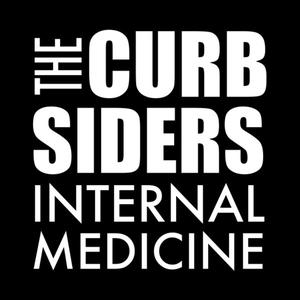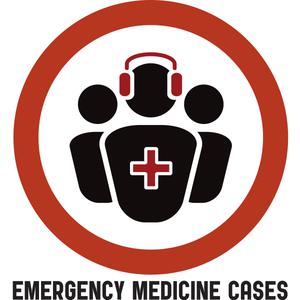
99 Topics for the CCFP
Dr. Brady Bouchard
A podcast series and accompanying study notes for the Canadian Certification Examination in Family Medicine, and practice beyond. #FOAMED
- 27 minutes 27 secondsFractures
Co-host: Dr. Chris Beavington (FMR3 in Sports and Exercise Medicine)
This week, Dr. Chris Beavington tackles the orthopedic content for the Family Medicine examination.
This week's links:
30 October 2017, 6:00 am - 54 minutes 12 secondsAsthma
Co-host: Dr. Mike Kirlew
All that wheezes is not asthma! But it's a good place to start.
This week's links:
9 October 2017, 6:00 am - 42 minutes 7 secondsCancer
Co-host: Dr. Mike Kirlew
This week, Mike and I discuss cancer care. The best takeaway from this talk: sometimes patients can disappear into a "cancer blackhole" when they're diagnosed, where they're busy with specialist appointment after specialist appointment. Consider pre-booking appointments with these patients at regular intervals to help them navigate the process, discuss any issues that might pop up (don't forget, depression is very common), and remember: their non-cancer health continues - they still need ongoing preventative screening for other conditions!
This week's links:
18 February 2017, 6:00 am - 41 minutes 55 secondsInfertility
Co-host: Dr. Mike Kirlew
This week, Mike and I discuss how to approach the common presenting complaint of "we've been trying, but we can't seem to get pregnant... help us!"
This week's links:
5 February 2017, 6:00 am - 34 minutes 25 secondsDyspepsia
Co-host: Dr. Mike Kirlew
Remember: H. pylori serology does not indicate current infection!
This week's links:
20 November 2016, 6:00 am - 41 minutes 24 secondsLow Back Pain
Co-host: Dr. Mike Kirlew
Happy Thanksgiving!
(This talk was recorded in July 2016 — it's a good one!)
Links from this week's talk:
- Highly recommended: Saskatchewan Spine Pathway
- Dr. Mike Evans - Low Back Pain
9 October 2016, 6:00 am - 41 minutes 20 secondsPeriodic Health Assessment Screening
Co-host: Dr. Mike Kirlew
Links from this week's talk:
1 August 2016, 7:48 am - 43 minutes 38 secondsImmigrants
Co-host: Dr. Mike Kirlew
Links from this week's talk:
18 May 2016, 6:00 am - 41 minutes 24 secondsDeep Vein Thrombosis (DVT)
Co-host: Dr. Mike Kirlew
This week Mike and I talk Deep Vein Thrombosis (DVT). This topic overlaps with pulmonary embolism (PE) somewhat, which we've already discussed as part of the talk on Chest Pain.
Links from this week's talk:
25 March 2016, 6:00 am - 18 minutes 48 secondsSpecial: Practicing for the SOOs
Guest hosts: Dr. Sonali Srivastava, Dr. Mark Karanofksy — Family physician at Jewish General Hospital (McGill University training site)
This week, we have a special episode for you! A special thank you to guest hosts Dr. Srivastava and Karanofksy, who chat about Simulated Office Orals (SOOs), a core part of the CCFP examination. Bullet points are included below:
How do you think residents should prepare for the SOO? What specifically can they do to practice?
- Practice with staff, and practice within a study group — each prepare a different case and practice with each other.
- Be careful not to read all the cases beforehand.
How many SOO's do you think they should do before the actual exam?
- No real number, until you are comfortable.
- Once you master the process of the exam, practice only if you need more confidence.
How much before the exam should they begin practicing?
- It is hard to do an interview with two problems and a social context in R1. Usually we do 1-2 sessions in R1.
- In R2 we do 4 sessions through the residency programme, but then the residents will do a few on the side with each other. A few residents seek out staff to do other SOOs with them in the last few months. I wouldn't worry or spend too much time until 3-4 months into R2. Before then you're likely not ready.
What are the common mistakes people make?
- Cheating on the review of systems.
- Time management.
- Not listening to the answers the patient gives.
- Not listening for cues.
- Not asking questions for all reasonable differential diagnoses (you'll never know what counts for marks and what doesn't).
- Forget to ask for old records.
- Forget to say you would perform physical exam.
- Forget to FIFE: but don't do it obviously / on auto-pilot!
- Not telling the patient what you think the diagnosis / differential is.
- Missing the context integration statement.
Where do people often lose marks?
- All over the place!
- Usually I have seen candidates miss on the differential, review of systems, premature closure, and forgetting to ask about the social context.
If someone gets stuck mid-SOO, what should they do?
- Summarize! "Do I understand you correctly?"
In your experience, what makes someone really great at doing the SOOs?
- Smooth, patient-centred interviewing; not "machine gunning" yes/no questions, calm approach, interested in making the patient better and negotiating a plan – not dictating one.
Do you remember any candidates that stood out for either being really great or losing steam? What did they do to get themselves in that position?
- Don't challenge the examiner or question the ethics of the exam!
- Don't try to get the examiner to tell you the second problem directly.
- Don't listen to the answers then just move on. Don't ask questions just to ask, the responses should be heard and addressed if needed.
- Abrupt, arrogant, or condescending approach does not go over well in this exam.
Let's say it all goes wrong during the SOOs and the resident feels the actor was not being true to their part, what systems are in place for reporting this?
- Forget about it and move on to the next one. You'll have time after the last case is done to think about it.
- Address your concerns to the staff on site – there is a site coordinator. Also write it in your feedback after the exam. Speak to the on-site staff they will help direct you if you feel there was an issue.
- Don't forget, other candidates may get different information based on the questions they ask. Examiners don't volunteer information at times that easily if it says in the script to only answer if candidate asks specifically. You may not get information because you didn't ask the right question.
Any words of wisdom would you like to impart?
- 15 minutes: 2 problems, 1 social context. 1 context integration statement, and manage both. Check with the patient: make sure they agree with each plan.
- Don't leave the room early. You are allowed to, but don't. Ask more questions.
- Don't cheat on the review of systems or the differential diagnoses questions.
- With the three-minutes-left prompt, say something like "So I see you have problem A and also Problem B all in the social context C. That must be difficult and I want to help you through it".
- In management, remember to offer pharma and non-pharma options for treatment if applicable and to involve a support network in plan.
This week's links:
5 March 2016, 6:00 am - 56 minutes 46 secondsFever
Co-host: Dr. Mike Kirlew
This week we talk about fever, which is a super common presenting complaint both in Primary Care and in the Emergency Department. Most of the CCFP exam's focus seems to be on children with fever, but we talk about a few other related conditions as well that can occur in adults.
Links from this week's talk:
1 March 2016, 6:00 am - More Episodes? Get the App
Your feedback is valuable to us. Should you encounter any bugs, glitches, lack of functionality or other problems, please email us on [email protected] or join Moon.FM Telegram Group where you can talk directly to the dev team who are happy to answer any queries.
 The Curbsiders Internal Medicine Podcast
The Curbsiders Internal Medicine Podcast
 Emergency Medicine Cases
Emergency Medicine Cases
 Dr. Mike Kirlew Presents
Dr. Mike Kirlew Presents